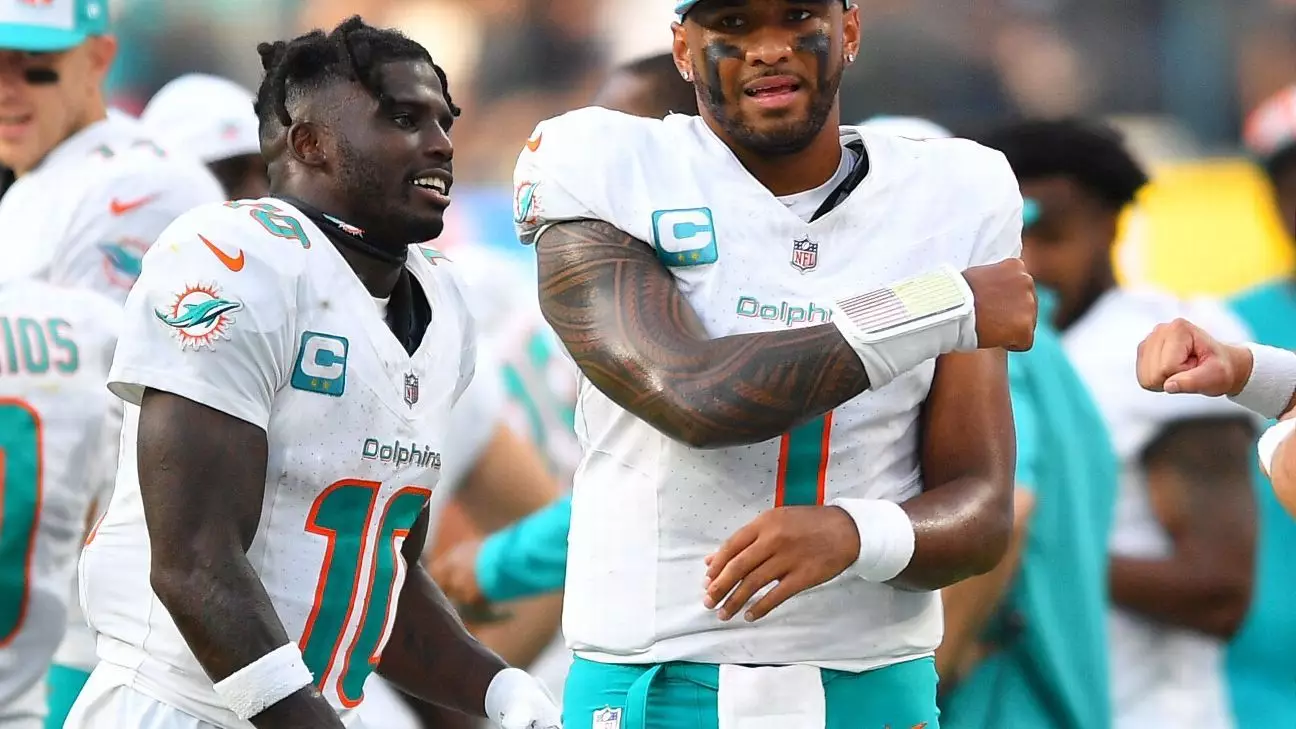In professional sports, the return of a key player can dramatically alter both the performance of the team and the morale within the locker room. This was the case for the Miami Dolphins as quarterback Tua Tagovailoa took the practice field once again, following a concerning concussion sustained in Week 2 of the NFL season. The impact of Tagovailoa’s presence was palpable, particularly for wide receiver Tyreek Hill, who described the return as a rekindling of a familiar, positive energy. For a squad that has struggled in his absence—recording a dismal 1-3 while ranking last in scoring—Tagovailoa’s return felt like a blessing that had been long awaited.
Hill’s exuberance illustrates not only his personal connection with Tagovailoa but also the unsung chemistry developed between quarterbacks and receivers. Hill remarked on the joy of reconnecting, stating, “It felt like old times.” This sentiment reflects the vital role that trust and synergy play within a team unit. When athletes rely on one another and share an understanding, their performances often spike, amplifying the team’s overall effectiveness.
An essential aspect often overlooked in discussions about player injuries is the statistical impact on the team’s offensive capability. During the four games without Tagovailoa, Miami’s offensive output has plummeted, ranking abysmally in crucial metrics. The stark reality is that the Dolphins’ offense has been rendered ineffective, with the team struggling to maintain momentum or establish a rhythm. The figures indicate a significant regression in the attacking phase, as highlighted by their standings in expected points added and yards per game.
This speaks volumes about Tagovailoa’s talent and contributions to the squad. He was not just one of the key players; his ability to drive plays forward and distribute the ball effectively made him invaluable to his teammates. The reduction in production for Hill, who is currently on pace for his worst statistical season, clearly underscores how interconnected a team’s success is to the health and performance of its leading players.
Beyond the analytical breakdown, there is inherently a human element that surrounds the sport of football. The emotional responses of the players when discussing Tagovailoa are indicative of strong interpersonal bonds that have developed within the team. Hill’s candid admission that he missed his quarterback’s voice and leadership adds depth to understanding how relationships fuel performance. It goes beyond the field and into the hearts and minds of the players, highlighting the psychological dimensions of teamwork.
Tagovailoa himself has recognized his responsibility to protect his health, especially after bearing the weight of injury concerns in his young career. The camaraderie within the Dolphins is evident not only in how they celebrate each other’s successes but also in the lighthearted admonitions from teammates telling him to slide more often. This sense of accountability adds another layer of complexity to player dynamics, as it shifts from merely being teammates to being extensions of a family that looks out for one another.
As the Dolphins await Tagovailoa’s official clearance to resume play, the cautious optimism within the organization is palpable. The quarterback’s limited participation during practice is a promising sign, but full participation in the following days will determine his ability to take the field Sunday. The process ensures he is assessed thoroughly, keeping player safety paramount in an era increasingly sensitive to head injuries.
Importantly, irrespective of the outcomes in practice this week, the emotional and psychological benefits brought about by Tagovailoa’s mere presence cannot be understated. It infuses a morale boost that might just be the catalyst the Dolphins need to turn the tide of their season. Players such as running back Raheem Mostert have expressed faith in Tagovailoa’s ability to adapt and improve his protective instincts on the field, displaying an understanding that safety must become a priority moving forward.
The return of Tua Tagovailoa marks not only a potential shift in the Dolphins’ season but also a broader narrative about resilience and recovery in sports. As the Dolphins look forward to their next game, the combined anticipation of fans, teammates, and coaching staff epitomizes the spirit of competition within the NFL. With Tagovailoa at the helm, there exists a renewed hope that the Dolphins can regain their offensive prowess and salvage their season in pursuit of a playoff berth.
Tagovailoa represents much more than just a player; he embodies the aspirations of a team seeking revival in the face of adversity. As the football world watches, it will surely be a poignant moment when he once again leads the Dolphins onto the field, marking the start of a new chapter in their season.


Leave a Reply